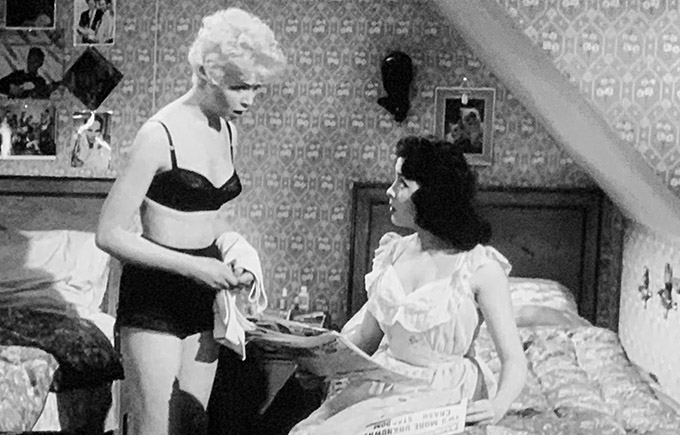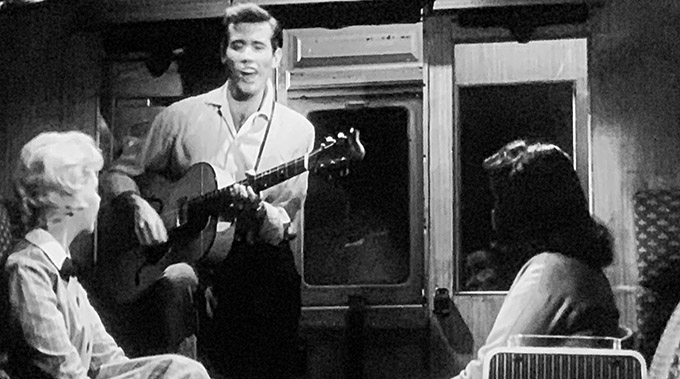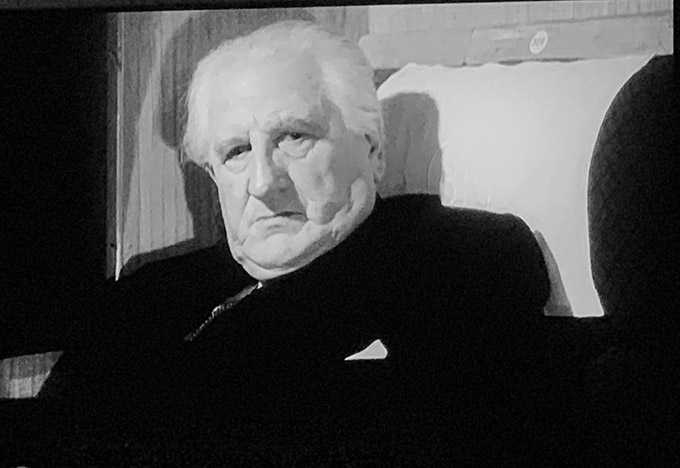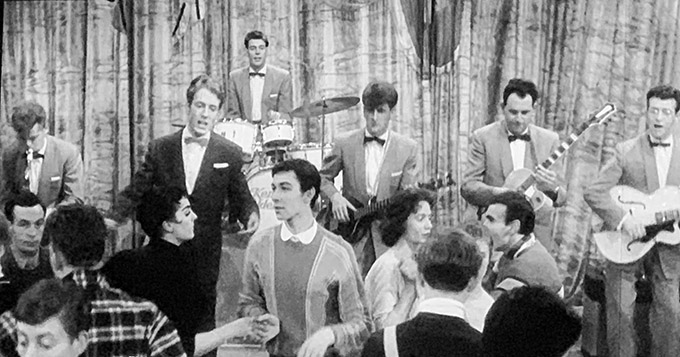6.5 Special
1958

Directed by Alfred Shaugghnessy
Written by Norman Hudis
CAST
Diane Todd – Anne
Avril Leslie- Judy
with as themselves
Lonnie Donegan
Dickie Valentine
Jim Dale
Petula Clark
Russ Hamilton
Joan Regan
The King Brothers
Jackie Dennis
Johnny Dankworth
Cleo Laine
Don Lang
The John Barry Seven
The Ken-Tones
Desmond Lane
Bernie Winters
Mike Winters
Josephine Douglas
Pete Murray
Freddie Mills
Finlay Currie
The 60s Retrospective Series

OK, it was 1958, but they did an edited version in 1962 as Calling All Cats.
The trouble is everyone in the cast is listed as SELF and I don’t recognize all of them.
The Six-Five Special was a TV series which ran from February 1957 to December 1958. It replaced the “toddler’s truce” where TV shut down from 6 to 7 so parents could get small kids to bed. These were the days just after the TV interval, where programmes would stop for ten minutes mid-evening so the nation could make their bedtime cocoa. The interval would be a potter’s wheel or goldfish in a bowl. Something circular anyway. That had to be ditched, because our energy supplies couldn’t cope with half the country switching on electric kettles or gas stoves at exactly the same time. It was “Six Five” because first came a five minute news bulletin then the show.
This was a pop exploitation. It was incredibly popular as the first major pop music TV show, and the first show directed at teenagers. It was originally meant to be intended as a few weeks’ stop gap until something better could be produced, but Six-Five Special gained a huge audience from the start . It ran to 92 episodes. Presented originally by Pete Murray and Josephine Douglas, the sudden impact of teenage music on a Saturday evening established its dominance overnight. Practically all pop music shows on British television then followed this early Saturday evening time slot as a result. (Oh Boy!, Drumbeat, Boy Meets Girls, Juke Box Jury, Thank Your Lucky Stars etc).
It was produced by freshly-graduated Jack Good, alongside Josephine Douglas, five years his senior who combined the role of co-producer with Jack Good, and co-presenter with Pete Murray. One of its (economical) features was pushing a lot of kids into a large studio with no set apart from a few platforms, and having them milling around on the floor. That would continue in TV pop. In the film, these sequences justify pulling back and having the huge BBC TV cameras in view.
In retrospect, it was staid. There’s a CD Early British Television Rock ‘n’ Roll which pairs surviving Six-Five Special tracks with music from its successor, Oh, Boy! The house band at Six-Five Special sound like the resident dance band at your local palais, and their contributions add to the theory that the first rock n’ roll was Louis Jordan’s jump jive. That’s what they sound like. Mainly it was Don Lang and His Frantic Five, who also recorded the theme music, though the Geoff Love Orchestra actually did the one they used. Oh, Boy! instantly sounds far more electric guitars and beat group.
The blu-ray booklet adds:
Although Jack Good’s initial plan was to establish a groundbreaking rock ‘n’ roll extravaganza for a television audience, it is fair to say that he fell well short of achieving this objective since the programme relied heavily on so many of the tried and trusted artistes of the early to mif-fifties, who had already established themselves as easy-listening crooners, balladeers and all-round entertainers. Petula Clark, Joan Regan, Dickie Valentine, Michael Holiday, Lita Rosa and Dennis Lotus all fell into this category – performers who had already secured an older audience. It was left to bands such as Don Lang & The Frantic Five, The John Barry Seven, skifflers such as Johnnie Duncan and the Bluegrass Boys and Lonnie Donegan, to provide the energy and exuberance indicative of of rock ‘n; roll, alongside a regular quotient of jazzbands led by Hymphrey Lyttelton, Johnny Dankworth or Chris Barber..
Geoff Leonard & Pete Walker, 2015, Network Bluray notes
The BBC was reluctant to use imported US talent too:
The promotion of home-grown talent with youth appeal was the chief part of the brief, which probably justified why the bigger names in rock ‘n’ roll (All American) – very rarely got a look in.
Geoff Leonard & Pete Walker, 2015, Network Bluray notes
Diane Todd who plays the role of Anne was already a regular singer on the Tonight nightly magazine news show. She had sung on Six Five Special too.Diane Todd has probably the least rock ‘n’ roll voice and delivery of anyone you have ever seen. Cocktail bar crooning. Unlike the character in the film, Anne, her performance was not the road to greater success.
It doesn’t take long to write a synopsis. Anne (Diane Todd) is singing some very retro 50s style song (You Are My Favourite Dream). Her friend, Judy, suggests they get a train … the 6.5 Special … from Edinburgh to London to see the show and maybe she can perform on it. Obviously this conversation takes place in their underwear, the only remotely potentially (but not actually) sexy thing in the film. Anne gets a neat nightdress, being a featured singer, so it’s Judy who has to expose her bra and pants.

The two girls board the train. Anne is still reluctant:

Every compartment has an act from the show. They all sing. Anne auditions for Pete Murray and Josephine Douglas who are on the train. DING! We switch to the studio where the next episode is being filmed. Anne sings a couple of over-enuciated operatic lines to introduce Dickie Valentine’s song. She’s promised a full slot next week. Bernie Winters and Mike Winters who did comic cameos in the film appear briefly. Boxer Freddie Mills used to do a sports segment on the show, so in this he’s seen directing a spotlight. And with the presenters.

As a small child I was taken to a neighbour who had a TV sometimes, at around 2 pm for Watch With Mother. I stared at the Flower Pot Men and Weed, and my sister told me they lived inside the TV. In a monochrome world, obviously. I believed her.
Viewers of this film presumably believed that all the cast got an actual train called the 6.5 Special and travelled through the dark (easier with a studio set train as you don;’t have to project anything through the windows) together to do the show once a week. Just as for years viewers of pop exploitation films believed that all the members of a group lived together.

Jim Dale: Train Kept A-Rollin
Jim Dale was first up, popping in to the girls compartment, singing a brief bit of his hit Sugartime, then doing The Train Kept A-Rollin’. It was originally a jump jive blues by Tiny Bradshaw, but is best known because of the version by Johnny Burnette with Paul Burlison on guitar. It’s quite amusing, as ever, to see a singer playing rhythm guitar miming the guitar solo. So no Americans, but covers of American material, just as Lonnie Donegan does at the end. Jim Dale aquits himself well, and went on to become the presenter of Six Five Special after Pete Murray, before switching to an acting career, notably in Carry On films. He also co-wrote Georgy Girl for The Seekers.

The Ken-Tones burbling away happily in harmony in the next carriage gave way to Desmond Lane. Yes, I asked ‘Desmond who?’ as well. It is him on clarinet on the posters performing The Midget. He got his showbix start on tin whistle, and we get that too. I think by now even the director was getting fed up of the train compartment because he appears at a station stop, playing to an adoring crowd. That must have been a first for him.

In the next compartment, Bernie Winters is insistently unfunny. Being a straight man is a difficult role, but Mike Winters is even less involved than Ernie Wise.

Johnny Dankworth does a bit with Train Gang in the luggage van, there being too many of them to cram into a compartment. Being the milk train, there are milk churns in view (for the young who imagine those three shapes in the foreground are bongos).

He hands over to Cleo Laine. All very well performed, as you would expect, but the drift away from Jim Dale’s actual teen-focussed rockabilly contribution is long. The morning papers also sit in the luggage van with Cleo.

In a typically 1958 sub–consciously racist piece of scripting, the two Trinidadian singers, Victor Soverell and Jimmy Lloyd turn out to be chefs in the train galley, not elite passengers.

Time stretches … Petula Clark is next and is at last blessed with a signature singing voice. It may not be rock ‘n’ roll, but her Baby Lover at least has beat and delivery.

Anne and Judy meet the ageing thespian, Finlay Currie who gives them avuncular (great-avuncular?) or perhaps curmudgeonly advice.

FINLAY CURRIE: Nowadays there’s hundreds of deluded, untalented, unteachable, starry-eyed something for nothing goofs who want to break into an already overcrowded profession. And it’s my mission to see that one more doesn’t join its scrambled and untidy ranks.
That may be a message from the TV show’s producers to the hundreds of hopefuls trying to get on the programme by writing in. That’s just what John Barry did, and he will be appearing shortly.
Joan Regan’s status has awarded her a sleeping car. We move outside to peep in through the window at her bedtime preparations.

We were both taken by the quality of her voice, though it’s a lovely piece of early 1950s singing.
It’s off to the dining car for Anne, where she discovers the lone inhabitants are Pete Murray and Josephine Douglas with a large pot of coffee. Not for the producers to wander about the train warbling.

Anne sings It’s A Wonderful Thing To Be Loved, and to our amazement they decide to give her a chance. I wouldn’t have.

Then we’re off to see the show being recorded, starting with Don Lang and His Frantic Five, a bunch of sub-Bill Haley wannabes who had a good couple of years around the show. I never knew Don played trombone as well.

Little did the BBC know that the song had almost the future title of a rival ITV Show from Jack Good, Boy Meets Girls, which aired in 1960.

Russ Hamilton continued the era’s love of warm pullovers and cardigans with If I Had A Dream. Also, male singers were always surrounded by adoring girls. Did they assume only girls liked pop music? Or only girls liked hunky male vocalists?
Watching it back, we agreed that the John Barry Seven’s two numbers were the highlight of the film. John Barry was to go on to compose so many film scores, including EIGHTEEN James Bond themes. In 1960, they recorded Hit & Miss, the Juke Box Jury theme. They went on to become the house band on Drumbeat, the show which replaced Six Five Special.
Here they captured his only recorded performances as a vocalist, and he is really good. There was a third recorded but not used which is hidden in the BBC archives somewhere.

This is one for the musicians, but what stood out for me was the sight of the bass guitarist playing a Hofner violin bass, as made famous later by Paul McCartney. Bass guitar was still rare in Britain, and when Jet Harris appeared with a Fender Precision Bass with The Shadows, it was novel. Notice that all the other bands on the bill utilise a double “doghouse” bass.

The violin bass appeared in 1956 in Germany, just a year earlier. The bass guitarist here would be Fred Kirk, I believe. Did the film inspire Paul McCartney to aspire to one?
John Barry was savvy. When he moved into film composing, the John Barry Seven continued to tour, with Bobby Carr taking over Barry’s trumpet role, for several years. Alan Bown eventually became the trumpet player. That version morphed into the Alan Bown Set.
Anyway, Barry was a way better than average vocalist, and his band was easily the best in the film too.
There was a dull dance sequence, followed by the very young Jackie Dennis on La-Dee-Dah. It became a Top Ten hit (UK #4). Unbelievable. His cover version of Purple People Eater is alleged to have sold one million worldwide though it only charted for a week in Britain (#29). He was fifteen.
He is wearing tartan trews and surrounded by tartan crap which suggests he may be of Hibernian extraction. All the girls appear several years older than him. I can hear the director shouting ‘Try to look as if you fancy him!’ That’s an actor’s job, not an extra’s role.

The King Brothers appeared with Hand Me Down My Walking Cane and Six Five Jive.

Anne gets to sing a couple of lines ahead of Dickie Valentine. There he is with his Frankie Vaughan imitation straw boater, prematurely middle-aged, surrounded by women in matching summer frocks.

He had a good future in cabaret and summer shows ahead, but poor Dickie was just so wrong for a teen show.
Lonnie Donegan rightly finished the show as the biggest name for the target audience. He performsWoody Guthrie’s Grand Coulee Dam, and Jack O’Diamonds. The latter is traditional, but known first via Blind Lemon Jefferson. Ten years later, Bob Dylan performed Grand Coulee Dam at the Woody Guthrie Memorial Concert, with The Band. While he never recorded Jack O’Diamonds, a version of the lyrics is on the sleeve of Another Side of Bob Dylan.

The cameras pull back to show the cameras so we can see it’s the programme being recorded. It’s hard to imagine what the curtains and pillars were doing there, left over from Dickie Valentine perhaps.

The end credits are lengthy and show pictures of each artiste with the title(s) of the songs they sang.
BLU RAY / DVD
This is one of the recent mid-price releases from Network or BFI where either you get a DVD and a Bluray, or just a Bluray. The transfer is sharp, soundtrack an excellent remaster. The bluray was a few pence cheaper than the DVD on amazon, and comes with a comprehensive booklet. Good value.

SOUNDTRACK
Filming started on 25th November 1957, with some studio musical sequences being filmed on the 17th. The John Barry Seven were even earlier completing both their slots on 14th November.
Six-Five Special – Geoff Love Orchestra
You Are My Favourite Dream – Diane Todd
Sugartime – Jim Dale
Train Kept A-Rollin’ – Jim Dale
The Gypsy In My Soul -The Ken-Tones
The Midgets – Desmond Lane
Train Gang – Johnny Dankworth & His Orchestra
What Am I Going To Tell Them Tonight? Cleo Laine with Johnny Dankworth & His Orchestra
Say Goodbye Now – Victor Soverall
Ever Since I Met Lucy- Jimmy Lloyd
Baby Lover- Petula Clark
I’ll Close My Eyes – Joan Regan
It’s A Wonderful Thing To Be Loved – Diane Todd
Boy Meets Girl – Don Lang & His Frantic Five
I Had A Dream – Russ Hamilton
You’ve Gotta Way – John Barry Seven
Ev’ry Which Way- John Barry Seven
Ice Blue (Dance Routine)- Geoff Love Orchestra
La Dee Dah – Jackie Dennis
Hand Me Down My Walking Cane – The King Brothers
Six Five Jive – The King Brothers
The King of Dixieland – Dickie Valentine
Come To My Arms – Dickie Valentine
Grand Coolee Dam – Lonnie Donegan
Jack O’Diamonds – Lonnie Donegan
POP EXPLOITATION FILMS ON THIS BLOG
The Six Five Special (1958)
The Young Ones (1962)
Play It Cool (1962)
Summer Holiday (1963)
What A Crazy World (1963)
Live It Up! (1963)
Just For You (1964)
Wonderful Life (1964)
A Hard Day’s Night (1964)
Gonks Go Beat (1965)
Catch Us If You Can (1965)
Help! (1965)
THE 60s REVISITED REVIEWS …

The Six Five Special (1958)
A Taste of Honey (1961)
The Young Ones (1962
Some People (1962)
Play It Cool (1962)
Summer Holiday (1963)
Sparrows Can’t Sing (1963)
The Small World of Sammy Lee (1963)
Tom Jones (1963)
The Fast Lady (1963)
What A Crazy World (1963)
Live It Up! (1963)
Just For You (1964)
The Chalk Garden (1964)
The Carpetbaggers (1964)
Wonderful Life (1964)
A Hard Day’s Night (1964)
The Yellow Rolls-Royce (1965)
Gonks Go Beat (1965)
Cat Ballou (1965)
The Ipcress File (1965)
Darling (1965)
The Knack (1965)
Catch Us If You Can (1965)
Help! (1965)
Doctor Zhivago (1965)
Morgan – A Suitable Case For Treatment (1966)
Alfie (1966)
Harper (aka The Moving Target) 1966
The Chase (1966)
The Trap (1966)
Georgy Girl (1966)
Fahrenheit 451 (1966)
Nevada Smith (1966)
Modesty Blaise (1966)
The Family Way (1967)
Privilege (1967)
Blow-up (1967)
Accident (1967)
Bonnie and Clyde (1967)
I’ll Never Forget What’s ‘Is Name (1967)
How I Won The War (1967)
Far From The Madding Crowd (1967)
Poor Cow (1967)
Here We Go Round The Mulberry Bush (1968)
The Magus (1968)
If …. (1968)
Girl On A Motorcycle (1968)
The Bofors Gun (1968)
The Devil Rides Out (aka The Devil’s Bride) (1968)
Work Is A Four Letter Word (1968)
The Party (1968)
Petulia (1968)
Barbarella (1968)The Thomas Crown Affair (1968)
Bullitt (1968)Deadfall (1968)
The Swimmer (1968)
Theorem (Teorema) (1968)
Medium Cool (1969)
The Magic Christian (1969)
The Rise and Rise of Michael Rimmer (1970)
Little Fauss and Big Halsy (1970)
Performance (1970)
Great touch of nostalgia. The original theme was sung by the Bob Cort Skiffle group.
LikeLike
I’m a co-writer of the booklet notes and would like to thank you for the review, which I really enjoyed!
LikeLike
Thanks. You may be interested in a parallel article on my Record Collecting site:
LikeLike